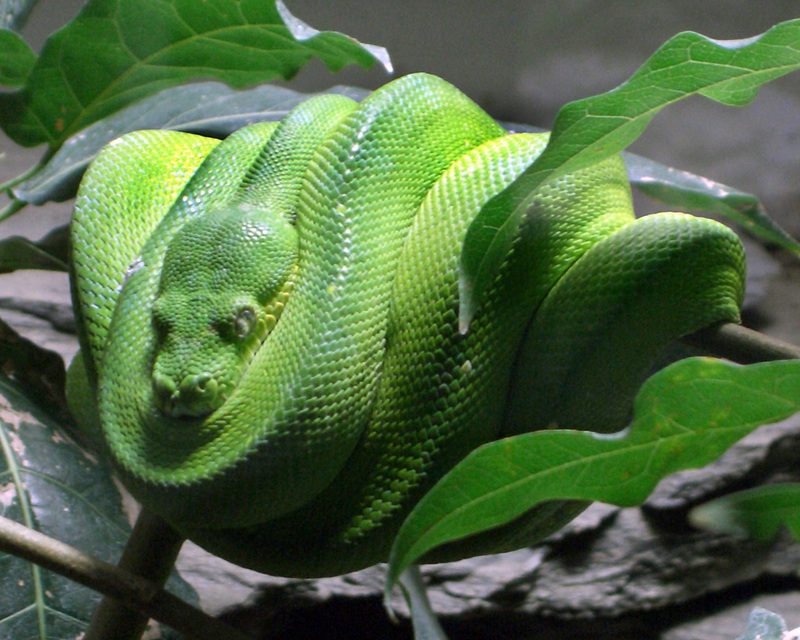|
| 질의: reptile | 결과: 1812번째/2587 | |
Green Tree Python (Morelia viridis) - Wiki
| 제목: | Green Tree Python (Morelia viridis) - Wiki
| |

| 해상도: 1024x819
파일크기: 329145 Bytes
등록시간: 2007:09:20 19:01:48
|
Morelia viridis
From Wikipedia, the free encyclopedia
[Photo] Beschreibung: Gr??ner Baumpython (Morelia Viridis). Fotograf: Mike Wesemann. Lizenzstatus: Public Domain
Green Tree Python (Morelia viridis) is a non-venomous python species found in New Guinea, various islands in Indonesia, and the Cape York Peninsula in Australia. Completely arboreal with a striking green color. No subspecies are currently recognized.
Description
Adults average 90-120 cm (3-4 feet) in length, with a maximum grow to about 213 cm (7 feet). The supralabial scales have thermoreceptive pits.
The color pattern is vivid green with a broken vertebral stripe of white or dull yellow. Spots of the same color, or blue spots, may be scattered over the body. Cyanomorphs are also known to occur.
Geographic range
Found in Indonesia (Misool, Salawati, Aru Islands, Schouten Islands, most of Western New Guinea), Papua New Guinea (including nearby islands from sea level to 1,800 m elevation, Normanby Island and the d'Entrecasteaux Islands) and Australia (Queensland along the east coast of the Cape York Peninsula). The type locality given is "Aroe-eilanden" (Aru Islands, Indonesia).
This species is sympatric with M. spilota and the two often compete in the same ecological niche.
Habitat
Rainforests, bushes and shrubs.
Conservation
The largest threat to the species is habitat destruction, particularly in Western New Guinea, which is currently occupied by Indonesia and is being logged by the Indonesian government. Many of these old growth forests that they live in are also inhabited by native papuan tribes who eat the snakes.
Behavior
Primarily arboreal, these snakes have a particular way of resting in the branches of trees; they loop a coil or two over the branches in a saddle position and place their head in the middle. This trait is shared with the emerald tree boa, Corallus caninus, of South America. This habit, along with their appearance, has caused people to confuse the two species when seen outside their natural habitat.
Feeding
The diet consists of small mammals, such as rodents, and sometimes reptiles. Despite many references in the literature, it does not include birds. Switak conducted field work on this issue and in examining stomach contents of more than 1,000 animals he did not find any evidence of avian prey items. Prey is captured by holding onto a branch using the prehensile tail and striking out from an s-shape position.
Reproduction
Oviparous, with 12-25 eggs per clutch. The eggs are incubated and protected by the female, often in in the hollow of a tree. Hatchlings are usually lemon yellow with broken stripes and spots of purple and brown, although golden or orange individuals may appear in the same clutch. In all cases, the color soon turns to green as snakes mature.
Captivity
These snakes are often bred and kept in captivity, although they are usually considered an advanced species. This is due to their specific care requirements, but once these are met they thrive in captivity. They second reason they are considered advanced is from wild caught individuals that often carry parasites and rarely tame down, although captive bred individuals usually calm down.
http://en.wikipedia.org/wiki/Morelia_viridis
| The text in this page is based on the copyrighted Wikipedia article shown in above URL. It is used under the GNU Free Documentation License. You may redistribute it, verbatim or modified, providing that you comply with the terms of the GFDL. |
|
댓글 |
|---|
| | 손님 |
|
Scientific Name: Morelia viridis (Schlegel, 1872)
Common Names: Green Python, Green Tree Python
Synonyms:
Chondropython azureus Meyer, 1874
Chondropython pulcher Sauvage, 1878
Chondropython viridis (Schlegel, 1872)
Python viridis Schlegel, 1872
Taxonomic Notes: This species has two subspecies: M. viridis viridis (Schlegel, 1872), M. viridis shireenae Hoser, 2003. |
^o^
동물그림창고 똑똑전화 누리집
^o^
|
|
|